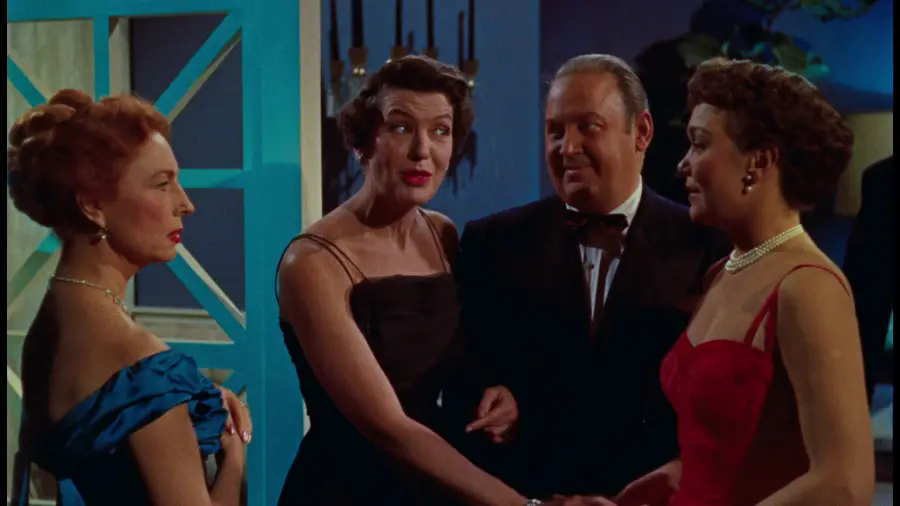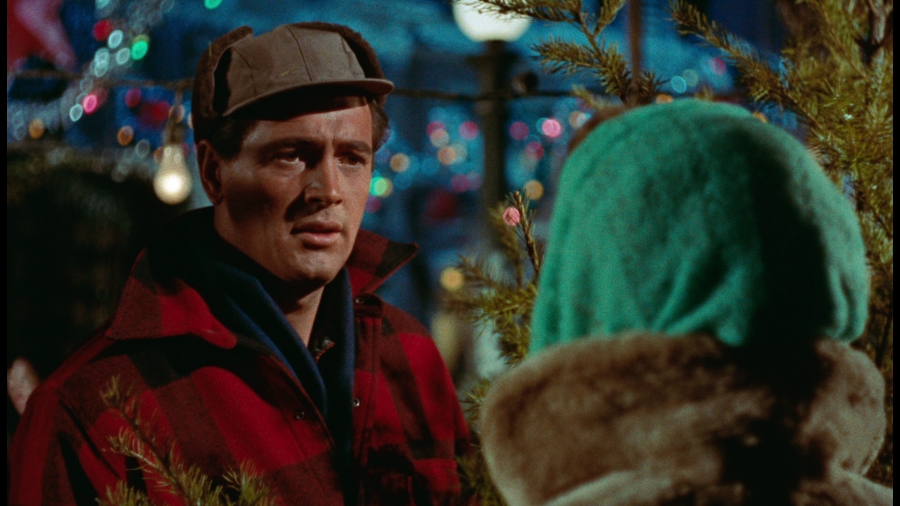All That Heaven Allows

See more details, packaging, or compare
Synopsis
This heartbreakingly beautiful indictment of 1950s American mores by Douglas Sirk follows the blossoming love between a well-off widow (Jane Wyman) and her handsome and earthy younger gardener (Rock Hudson). When their romance prompts the scorn of her children and country club friends, she must decide whether to pursue her own happiness or carry on a lonely, hemmed-in existence for the sake of the approval of others. With the help of ace cinematographer Russell Metty, Sirk imbues nearly every shot with a vivid and distinct emotional tenor. A profoundly felt film about class and conformity in small-town America, All That Heaven Allows is a pinnacle of expressionistic Hollywood melodrama.
Picture 9/10
Douglas Sirk’s All That Heaven Allows gets an impressive and significant upgrade over Criterion’s previous DVD release with a new dual-format edition. The Blu-ray presents the film with a new 1080p/24hz high-definition transfer while the first dual-layer DVD presents a standard-definition version of the same transfer. Criterion’s notes indicate the film was screened in various aspect ratios between 1.37:1 and 2.00:1 but Criterion presents in the aspect ratio of about 1.75:1, the ratio it appears to have been most commonly projected at. The DVD’s transfer has been enhanced for widescreen televisions.
This new transfer, created from the original 35mm camera negative, offers a sharp and drastic improvement over the old DVD. The colours, in particular, are the biggest improvement. The old Criterion DVD had decent colours, somewhat keeping the film’s Technicolor look, but they were a little faded and were a little more yellowish in look. Here they really pop, looking so much cleaner and purer (blues especially,) with some wonderful saturation, and black levels are strong, aiding in superb shadow delineation. The image is sharper with a higher level of detail (except maybe for moments where it looks like a soft focus has been applied,) delivering some nice textures and excellent rendering of film grain.
The print has also been nicely cleaned up. The previous DVD presents a large number of stains and some heavy debris in places, but this has mostly been removed. The edges of the frames show some wear and there’s still some slight damage in places, but it marks a drastic improvement over the old DVD’s transfer.
The new DVD found here also delivers a vastly superior image in comparison to the old DVD. Though the colours don’t reach the levels of the Blu-ray, they’re still better balanced here, still delivering some striking blues and reds, and a great amount of detail. Upscaled it looks fine but the Blu-ray’s transfer is still noticeably sharper.
In all this new presentation delivers a sharp and wonderful improvement over the old DVD, offering up a wonderful Technicolor presentation that on its own makes the upgrade worthwhile.








































Audio 7/10
The film’s mono soundtrack comes in lossless linear PCM 1.0 on the Blu-ray and Dolby Digital 1.0 on the DVD. Though fidelity is limited the track still does a wonderful job handling the film’s score, which of course swells up during all of the emotional scenes providing superb range and a decent amount of balance, delivered with only the slightest bit of an edge. Dialogue is clear and articulate, and the track has been cleaned up decently enough.
It still shows some limitations because of its age but it has been nicely restored.
Extras 8/10
This new edition gets a fairly extensive upgrade in supplements in comparison to the previous fairly light DVD edition, carrying over most of the material found on that DVD. The first big upgrade is a new audio commentary featuring film scholars John Mercer and Tamar Jeffers-McDonald. It’s an enjoyable enough track, talking about the film’s criticisms of social classes Sirk’s use of lighting to spell out moods or feelings in scenes or characters. But when it comes to the social themes within the film, I doubt many viewers who have seen the film already will find anything too surprising. The track gets more interesting when they give some historical context and talk about the film’s initial release and reactions to it, talk about Sirk’s other work, comment on Hudson’s acting, and also when they’re criticizing some of the more dated sexist elements found within it. Despite Mercer constantly plugging his book (though to be fair, I don’t think he actually mentions the title, and if he did I missed it) it’s an engaging enough track.
The next feature is a rather intriguing inclusion, though I’m admittedly not entirely sure what to make of it. Mark Rappaport’s 1992 film Rock Hudson’s Home Movies is a compilation of many clips from Hudson’s films (all looking to be taken from video) with narration by Eric Farr, though the narration is presented as Hudson’s own remarks. The clips and narration seem to suggest that Hudson’s own homosexuality was always present on screen in sly actions and innuendos and if people just looked it would have been obvious Hudson was gay. Rappaport samples long sections of clips from a number of Hudson’s films, concentrating on moments and lines that suggest a homosexual context, some of it glaring (Otto Kruger getting really touchy/feely with Hudson in Magnificent Obsession) while others might be pushing it (it’s not like Hudson’s films were the only ones at the time that presented a lot of bare chested men together, or featured older bachelors with no interest in getting married.) There are amusing moments like catching costar Tony Randall catching a quick glance or five of Hudson’s bare chest, or the narrator/Hudson relishing in the fact he got to beat up a “macho” man like John Wayne on screen, but ultimately I guess I’m not sure what the film’s ultimate intentions are. It is a breezy 64-minutes, though, and certainly worth watching, and it’s a rather imaginative inclusion on Criterion’s part.
Criterion next feature includes “excerpts” from a 1979 BBC documentary called Behind the Mirror: A Profile of Douglas Sirk. This feature was also available on the previous DVD, though they differ in running times: the old disc presents a roughly 31-minute version, while this release presents a 57-minute version. Since Criterion still uses the word “excerpts” in their description I’m going to guess the whole thing is still not here. The primary difference I noticed between the two is that this longer version includes a lot of clips from Sirk’s films, which are missing from the shorter version Criterion presented previously.
The piece presents an interview with Sirk, talking about his life and career, from the rather lengthy escape from the Nazis (he had to move from country to country within Europe until finally making the move to the States) and explains he got into film only as a way to find a job in the States (UFA, the studio in Germany, wanted him to come back because of past successes but he made it clear as long as the Nazis were in power he was never going back.) From here he talks about his films in the States and his move to his more popular melodramas (a term he doesn’t completely understand.) He explains what themes drew him to films like Magnificent Obsession, All That Heaven Allows, and Written on the Wind, hoping that maybe it might attract European audiences on top of American ones. It’s an absolutely fascinating discussion with the filmmaker and it’s a wonderful inclusion, but half of the piece is made up of film clips that I don’t think were entirely necessary. But I guess you have the option to fast forward through them.
Looking to come from a 2007 French DVD release of a Sirk film (I can’t say which one) Criterion pulls in an interview with William Reynolds, who plays that twerp Ned in the film. Reynolds gets into the details about being a “Contract Kid” in the studio system along with Rock Hudson (whose career, of course, would later take off) and the work he did with Sirk. He talks about the director on a fairly personal level and then comments on his films. Reynolds has a very deep and rather vast understanding of photography and lighting, much more than I’ve seen from other actors in interviews, and his comments about the look of Sirk’s films and what makes them so unique are all the more insightful because of it (he also complains a little about how long it took to light most of the scenes.) He also talks a bit more about Hudson, who he knew before he became a big star, and admits he didn’t think he was much of an actor early on but saw him develop and grow over the years. Though he certainly offers some nice insights into Sirk’s work it’s great getting some first-hand accounts about what it was like being on contract in the studio system. The feature runs 23-minutes.
Criterion then digs up another interview with Sirk, this time from a 1982 episode of the French television program Cinéma cinemas. Here Sirk gets into more technical details of his work, going over the lighting, editing, photography, and use of music, making a nice companion to the previous Sirk interview. It runs about 15-minutes.
The features then close with the film’s theatrical trailer.
The DVDs present the commentary and trailer on the first disc with the film, while the second dual-layer disc presents the remaining features.
The booklet then contains the same essay by Laura Mulvey found in the insert of the previous DVD, along with Rainer Werner Fassbinder’s essay on All That Heaven Allows. This latter essay is a great read in particular. The Fassbinder essay was presented as a text supplement on the original DVD.
Unfortunately there is material that did not make it over from the DVD. Yet again Criterion does not carry over a photo gallery that was on the original DVD, a gallery which presented a number of production photos and posters. Criterion had also included six of Fassbinder’s essays on Sirk’s films as text supplements: along with All That Heaven Allows Criterion also included his essays on Written on the Wind, Interlude, The Tarnished Angels, A Time to Love and a Time to Die, and Imitation of Life, along with an introduction and conclusion. This is especially disappointing since they’re all rather fascinating and funny observations of Sirk’s work. I’m hoping this means Criterion might be releasing some of Sirk’s other films and will be including these essays with those.
Despite the missing material the new set offers a nice upgrade in supplements, delivering a great retrospective of sorts on Sirk’s work and career.
Closing
A stunning upgrade all-around, from it’s gorgeous transfer to entertaining supplements, this new edition of All That Heaven Allows comes with a very high recommendation.








